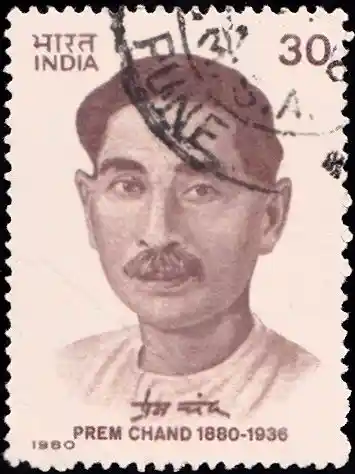Emperor Among Novelists
His stories were so heart-touching and real that, the great Bengali novelist Sharat Chandra Chattopadhyay gave him the title of “Upanyas Samrat”. An empathetic Hindi storyteller, this novelist left no stone unturned to unravel the rural miseries in colonial India.

Premchand. Illustrated by Dishani Goswami: Visual Storyteller at ThisDay
He was neither a moneylender nor belonged to an affluent family yet was called Munshi ji. His only asset was his intellectual understanding and portrayal of Indian society in his literary work which made him Munshi Premchand. A munshi who laid claim to having the ability to illustrate some of the most poignant tales, with his simple yet gripping storytelling. His writing impulse dates back to the time when he would go by the pseudo name of Nawab Rai for his short stories and novellas to be published locally.
He was born as Dhanpat Rai and brought up in Lamhi, a village in Varanasi. The loss of his mother and grandmother in his childhood left him with nobody to confide in as his father was a busy man, earning a livelihood. The majestic collection of letters in Hindi, Persian, Urdu and English came to his rescue and Dhanpat would often find comfort in them as he would read, build and live in his own castle of thoughts.
The pseudo-name “Premchand” comes with its own set of controversy fueled by Nawab Rai’s first collection of stories, “Soz -e- Watan” with five stories of revolutionary plots against the British Raaj which acted as a catalyst to spark and re-energise the freedom struggle amongst his readers in 1907. The British Collector of Hamirpur, James Samuel Stevenson found this literary piece an instigator of lawlessness in the district and immediately ordered a raid in Nawab Rai’s house to burn any copy of the collection of stories left. Devasted, Dhanpat Rai came across a silver lining when his acquaintance and editor of Urdu magazine Zamana suggested him not to lose hope and start writing with the pen name Premchand which remained the same till his last breath.
As a teacher by profession and an emerging writer of those times Premchand would settle from one place to another in search of a better livelihood to support the finances of his family. His first wife left him as their relationship couldn’t withstand the immaturity at such young age as they got married in their childhood. He later remarried a child widow, Shivarani Devi in 1906 which saw outcry amongst many people from the village but Premchand was adamant and didn’t believe in irrational rules against women.
The colonial rural set up of India is beautifully depicted and mingled in the tales of Premchand where the feudal order and exploitative nature of Sahukaars, the political ambitions of the affluent, the malpractice of dowry, child marriage, women’s restriction to the domestic sphere wasn’t ostentatiously presented but subtly ingrained in the roles of the characters with live appeal seeded in them. Premchand’s rural background and an eye for the intricacies of the lives of the downtrodden in society found their existence in his critically acclaimed novels like Godan, Nirmala, Gaban, Sevasadan, Rangbhoomi showcased some extremely heart-wrenching situations which were weathering away the moralities of a rather ‘moral Indian society’ as the men in power would preach.
Human emotions and relations were beautifully captured in his stories like Idgah, Bade Bhai Sahab, Kaphan, Panch Parameshvar, Poos ki Raat, Gupt Dhan and many more. The emotions and the world a child lived in, the relationship between two brothers, a poor man’s only hope and greed were the strong facets his characters displayed.
Shatranj ke Khiladi is one of the famous movies to date which was an adaptation of his story with the same name.
In his stay at Bombay as a writer of movies in 1934, Premchand’s story on Mazdoor was so revolutionary in nature that it ended up inspiring the labourers to join hands against the exploitative nature of industrialists. This triggered the industrialists to push and shut the release of the film leading to huge losses. Himanshu Rai, the owner and founder of Bombay Talkies failed in his attempt to keep writing in movies. Premchand returned from Bombay to Allahabad and became the first President of the Progressive Writers’ Association in 1936. The organisation was an anti-imperialist and left-oriented organization of writers like Kaifi Azmi, Ismat Chughtai, Faiz Ahmed Faiz, Sahir Ludhianvi, Amrita Pritam, Mulk Raj Anand and many such popular writers.
Premchand’s health started troubling him and after his prolonged struggle he passed away on the 8th of October, 1936 leaving his beloved readers with a huge sum of 300 short stories, critical essays and novels of great acclamation.

A postal stamp issued by the Indian Posts and Telegraphs Department in 1980 to commemorate Premchand ji; Image Source: Public Domain


